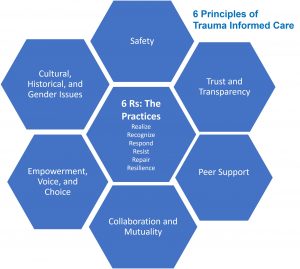The 6 Rs and 6 Principles of Trauma Informed Care
 The Substance Abuse and Mental Health Services Administration’s framework of a Trauma-Informed Care approach identifies 4 Rs (Realize, Recognize, Respond, and Resist Retraumatizing) that make good benchmarks to tell if we are headed in the right direction. SAMHSA says:
The Substance Abuse and Mental Health Services Administration’s framework of a Trauma-Informed Care approach identifies 4 Rs (Realize, Recognize, Respond, and Resist Retraumatizing) that make good benchmarks to tell if we are headed in the right direction. SAMHSA says:
A trauma-informed congregation realizes the widespread impact of trauma and understands how trauma can affect individuals, families, communities, and even the congregation; recognizes the signs of trauma and the practices of resilience and HOPE; and responds by actively practicing what we know brings healing and resilience in all areas of the congregation. People are gentle with each other and actively resist retraumatization by applying relational healing modes, especially in situations of conflict or disruption.
The Chicagoland Trauma Informed Congregations Network added two more Rs (Repair and Resilience):
A trauma-informed congregation repairs relationships by acknowledging ways in which our faith communities have been sources of trauma through abuse, judgement, rejection and abasement and actively work to do justice and repair relationships; and trusts the power and wisdom of our scriptures and spiritual practices to cultivate resilience and well-being across all ages.
See page 55 in the book for more information.
SAMHSA also suggests 6 Principles that should undergird everything that we do in trauma-informed care.
- Safety: The physical setting is safe and interpersonal interactions promote a sense of respect, nonjudgement, and safety
- Trustworthiness and Transparency: Those receiving services believe that those who are serving operate with honesty and genuine commitment to their well-being. This happens through accountability, well-defined roles and expectations, and clear communication
- Peer Support: We are all affected by trauma. When we enter into mutual, supportive relationships, it promotes healing and recovery.
- Collaboration and Mutuality: Everyone has a role to play in a trauma-informed approach. Decisions, power, and actions should be shared.
- Empowerment, Voice, and Choice: Recognize and build on individuals’ strengths and experiences. Trust people’s God-given ability to heal and have agency.
- Cultural, Historical, and Gender Issues: Intentionally attend to biases and stereotypes. Leverage the healing value of cultural connections. Recognize and address the effects of historical trauma.
The 6 Rs and the 6 Principles work together to help communities understand and create spaces of healing for the intergenerational trauma that exists in their midst. These practices recognize and protect the dignity and humanity of everyone. They remind us that we are all more than adversities that have shaped us. God calls all of us beloved.



